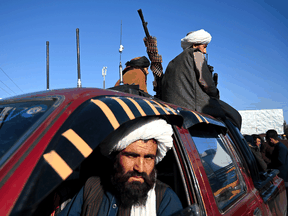Afghans promised safety by Canada have had agonizing, dangerous and long wait
Nearly seven months after Kabul fell to the Taliban, civilians who aided Canada's 13-year Afghanistan mission say their applications for government immigration programs have been ignored
Author of the article:Bryan Passifiume
Publishing date:Mar 08, 2022

Half a year after they returned to power in Afghanistan, Taliban arrests of Westerners are growing in frequency.
PHOTO BY WAKIL KOHSAR/AFP VIA GETTY IMAGES
Six months later, and he’s still wondering where Canada went.
For those whose service with Canada’s Afghanistan mission branded them traitors in the eyes of the Taliban, life has become a desperate game of hide-and-survive.
“We have no money, no home and no food,” said Qalandari, who asked he only be identified by his surname to protect his family.
Six months later, and he’s still wondering where Canada went.
For those whose service with Canada’s Afghanistan mission branded them traitors in the eyes of the Taliban, life has become a desperate game of hide-and-survive.
“We have no money, no home and no food,” said Qalandari, who asked he only be identified by his surname to protect his family.
“Our children are not going to school.”
Qalandari was one of the thousands of Afghan nationals who worked as an LEC — Locally-Employed Civilian — with allied forces during their respective missions in Afghanistan.
He was hired in the early 2010s by the Canadian Armed Forces as a heavy equipment operator and logistics specialist in Kandahar, a job he says he held for the balance of Canada’s presence in Afghanistan.
He continued to work in the field, supporting his wife and children, until Kabul fell to the Taliban last August.

Canada promised to take in up to 40,000 Afghan refugees. Where are they?

Thousands of Canada's allies and their families stranded in Afghanistan
Then, everything changed.
News that the Taliban was going door-to-door searching for “traitors and collaborators” — and Qalandari’s service with the Canadian Forces surely made him that in their eyes — sent him and his family underground, leaving behind their home for a life on the run.
“My children ask me every day, why the Canadian Armed Forces aren’t helping us,” he said.
“My wife sold her gold, this is the last of our money.”
Last August, Qalandari was relieved to see Canada had joined other allies in promising safe passage in exchange for past service, and he wasted no time signing up.
Other than an automated reply to an October email requesting an update on his application, that was the last he heard from Immigration, Refugees and Citizenship Canada (IRCC).
For the hundreds of Afghan families lucky to find new lives in Canada, thousands more continue to wait for word on their applications.
Canada’s efforts to evacuate both Canadians and Afghan nationals during last summer’s fall of Kabul have been roundly criticized as inadequate and dangerous.
While other nations either airlifted evacuees to safety or dispatched armed escorts to waiting flights, Global Affairs Canada largely left its evacuees to fend for themselves.
The Toronto Sun spoke with several evacuees last summer who say they were directed by GAC emails to wear red and present themselves either at the Kabul airport’s north gate, or later in the week to meet Canadian consular officials at a hotel.
Those who followed the instructions reported being turned away by soldiers at gunpoint, or even targeted by the Taliban, who got wind of Canada’s “wear red” edict and delivered beatings on anybody caught wearing red clothing.
My children ask me every day, why the Canadian Armed Forces aren't helping us
Canadians left stranded in Kabul reported being shocked to receive emails from GAC seeking consent to disclose their location to “local authorities.”
Since returning to power, the Taliban commenced a crackdown on what they consider to be foreigners meddling in their affairs.
On Monday, the Washington Post reported Nadima Noor — a 38-year-old Canadian woman who ran a small humanitarian organization in Afghanistan — was taken into custody last month after a Taliban raid on her office.
Her brother told the newspaper that while colleagues arrested alongside her that day were subsequently released, Noor remains in custody.
Taliban officials have so far refused to comment publicly on her case or even say what laws she’s accused of breaking.
Taliban arrests of Westerners are growing in frequency.
Citing a senior Taliban intelligence officer, the Washington Post reported a total of eight Westerners in Taliban custody — mostly British, but also at least one American.
For those who’ve helped desperate Afghans flee to safety, Qalandari’s story is an all-too-familiar one.
Chris Ecklund, founder of the Canadian Heroes Foundation who helped facilitate numerous rescues of Canadian Forces contractors and interpreters, said that for every family they’ve managed to help, untold others were left behind.
“A day does not go by where I don’t get an email or message from somebody,” he said.
“It never, ever stops.”
Ecklund organized teams in Afghanistan and secured money — sometimes spending as much as $100,000 per week — to rent homes, apartments and villas to use as safehouses, pay for visas and travel documents, and help usher entire families to freedom.
“This is something that’s going to go on for years and years,” he said.
Inquiries to Immigration, Refugees and Citizenship Canada went unreturned.
For Qalandari — and the others Canada left behind in Afghanistan — keeping one step ahead of the Taliban has become part of the daily routine, as is his fear that one day his family’s luck may run out.
“My life’s in more tension from the end of August until now,” he said.
“We’ve lost everything.”
• Email: bpassifiume@postmedia.com | Twitter: bryanpassifiume
No comments:
Post a Comment